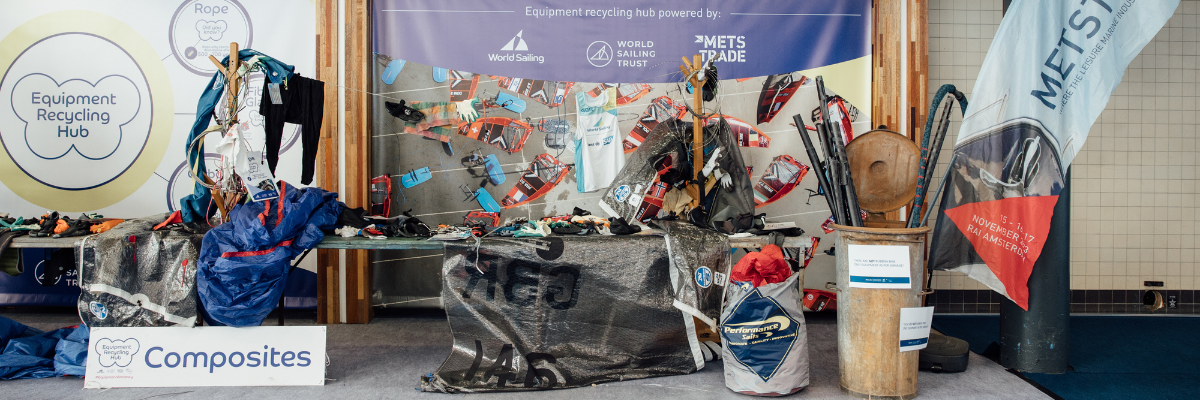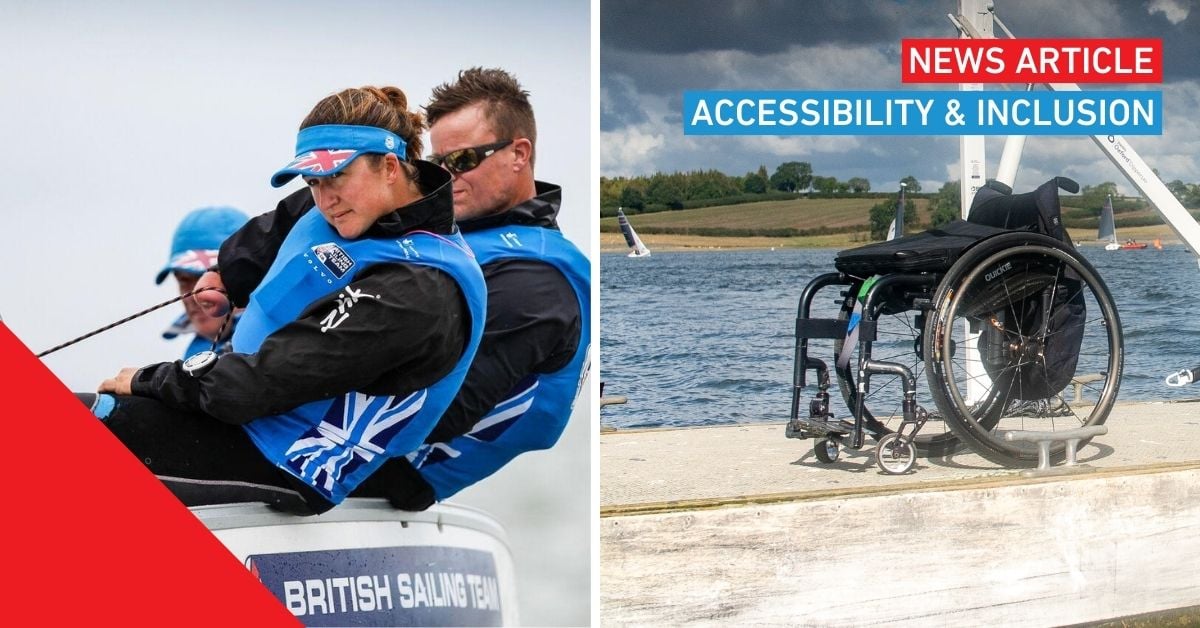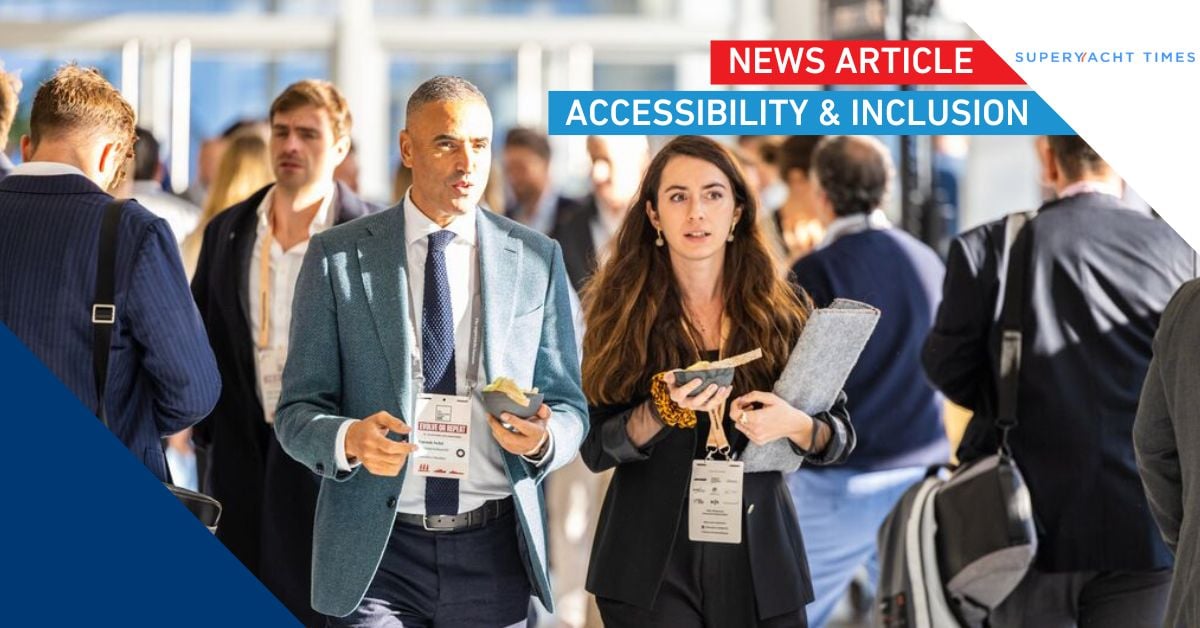Turning sailing rubbish to gold
A joint venture in 2023 between World Sailing, the World Sailing Trust, and METSTRADE is raising awareness of disposal problems with legacy equipment and the exciting potential for re-use to boost participation in the sport.
It has long been said that one person’s rubbish is another person’s gold.
That truism was certainly brought up to date when the first Equipment Recycling Hub was piloted at the 2023 Allianz Sailing World Championships in Scheveningen, Netherlands. This collaboration between World Sailing, World Sailing Trust, and METSTRADE collected a fascinating haul of composites, sails, rope, rigging such as blocks and clothing. The highest number of donations were sailing gloves, often treated by competitors as a very disposable commodity and quite challenging to recycle due to the variety of materials and construction materials involved.
The material collected was then featured on an Equipment Recycling Hub display in Hall 12 at METSTRADE last year. It was poignant to view it there – many of the items will have commenced their product journeys as launches at the show. Representative samples were now back on display after their initial owners had declared them surplus to requirements. It served to remind the global marine trade of the importance of developing second uses and repurposing paths for the products it manufactures.
Creating a structure for re-use and recycling
British Paralympic sailor and now World Sailing’s Head of Sustainability, Alexandra Rickham, confirms this pilot is just a starting point for what is hoped to grow into a much larger initiative: “The Equipment Recycling Hub last summer was a trial and we had quite a good amount that was collected. We had nothing to compare against what we achieved because it was a first, but the exercise commenced our learning curve.
“Being able to display the items at METSTRADE then provided opportunity for engagement with the marine industry – we got some good input from the ideas box on the stand. What we need to do next is form partnerships and make connections to broaden the reach of this trial. We hope to set up a similar recycling hub at the Paris 2024 Olympics and take the learnings from last year to the games – it would be exciting to be able to do that.”
The choice of elite sailing to commence this initiative has several advantages. High-performance equipment is often discarded much earlier in its lifecycle than would otherwise be the case for more leisurely uses. Something that is sub-optimal for a championship contender has the potential for many years of service in the hands of less demanding applications. Events like the World Championships and Olympics also bring the oxygen of publicity, helping drive new concepts down through classes and even to club and individual level.
Focus on people and planet
The Equipment Recycling Hub is one of several important environmental initiatives being pioneered by the World Sailing Trust. This international charity was founded by its namesake in 2018 to inspire greater diversity, equity and inclusion in sailing across the globe and establish partnerships to safeguard the future of sailing and our planet’s waters.
Its first major environmental project was as a founder of the Carbon Fibre Circular Alliance – an organisation that harnesses the expertise of leading international federations and companies from four sports that are reliant on composites – sailing, tennis, cycling and biathlon, supported by the International Olympic Committee. The objective is to solve the known difficulties of recycling carbon fibre products and components when they reach end of life.
The technical lead, Lineat Composites, assisted by the research department of the University of Bristol in the UK, has now shown how it is possible to reclaim carbon components by re-aligning the fibres into uni-directional prepreg tapes. The first test products are incorporating this remanufactured material within their structures. Far from being inferior, this recycled carbon is proving to be potentially stronger than the original.
The Carbon Fibre Circular Alliance initiative prompted METSTRADE to donate the proceeds of the DAME Awards entry fees to the World Sailing Trust in 2022.
Distribution is key
Sailing may be an increasingly heavy user of carbon fibre, but the volume of discarded components is relatively low for any given location and time. For viable operation there would need to be a way to gather discarded equipment and deliver it to a place where it can be recycled. That’s another potential benefit of initiatives like the Equipment Recycling Hub if they become widespread.
Victoria Low, the Head of World Sailing Trust, chaired a round table with industry leaders and sustainability experts on the last day of METSTRADE to discuss the impacts of the hub and the wider issue of marine equipment disposal: “I thought it was quite a bold move for the show team to support this initiative. There’s a lot of focus around the exhibitors on how their products are becoming more sustainable, but nobody's talking about the dirty past and marine litter.
“The round table was a fantastic discussion with a key finding that the industry needs to work more closely together to deal with legacy waste. Another conclusion was there should be more work on repurposing equipment, especially from the elite end where there is real potential. For example, a 200m rope with a small flaw that writes it off for use on a super yacht could be broken back down and re-used to encourage greater participation in other sectors of the sport.”
Finding distribution methods will be key to ensuring repurposing works – not just gathering but also methods of putting it in the hands of new users. World Sailing Trust is considering trialling gift boxes containing second-use suitable items for distribution at major events.
The demand has already been established by other initiatives, as Victoria explains: “11th Hour Racing ran a campaign to support the Mini Transat community by letting them know they had a container full of kit to which they could help themselves – it was gone within half an hour. We have also drawn inspiration from the Optimist Class ROPE (Recycled Optimist Parts & Equipment Program). This grew out of a Mexican Sailing Federation initiative to encourage children to donate end of use Oppies and equipment to sailing schools and the like. ROPE has resulted in boats and parts being sent all around the world for second use, which is brilliant and gets this recycling and repurposing mindset into children. “So we have some great ideas and great calls to action. Now we need to look at how we can take that next step and find the funding to put it together.”
Further information
To read more about the work of the World Sailing Trust and see the partnership opportunities available visit worldsailingtrust.org/




